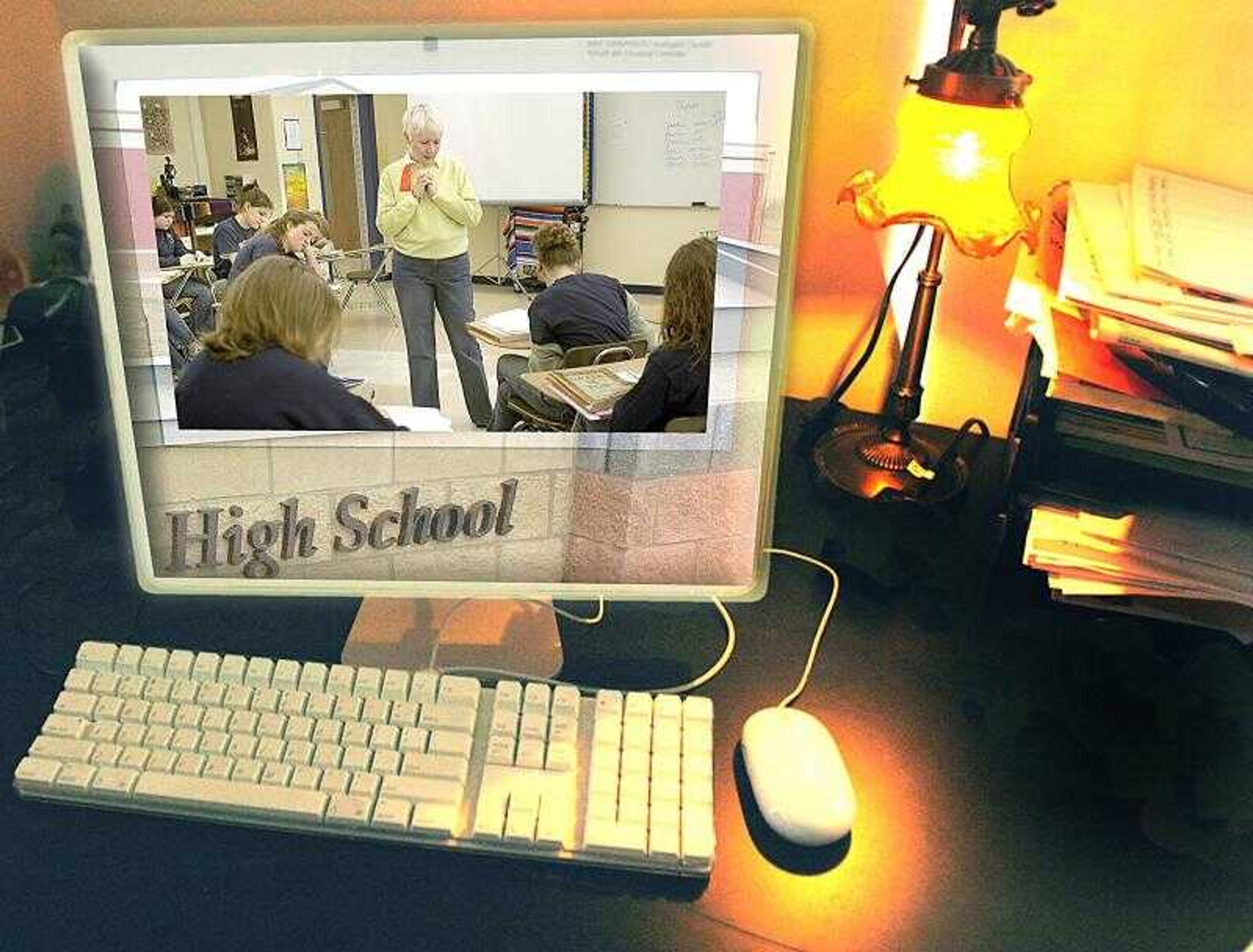Missouri readies virtual school for classes in August
No desks. No cafeteria. No recess. No principal. But the state of Missouri's new virtual school will have online classes for elementary and high school students starting in August. No online courses will be offered for middle-school students, grades six to eight, during the first year of the program. Courses for those students will be added in the second year, said Curt Fuchs, director of the Missouri Virtual Instructional Program, or MoVIP for short...
No desks. No cafeteria. No recess. No principal.
But the state of Missouri's new virtual school will have online classes for elementary and high school students starting in August.
No online courses will be offered for middle-school students, grades six to eight, during the first year of the program. Courses for those students will be added in the second year, said Curt Fuchs, director of the Missouri Virtual Instructional Program, or MoVIP for short.
Fuchs is part of a two-person staff whose job is to establish and market the online classes that will be offered through the Missouri Department of Elementary and Secondary Education.
The online classes will be offered to all Missouri students, from public to private to homeschooled, he said. Students will be able to learn online 24 hours a day, seven days a week, studying at their own pace.
"People sometimes think of online education as kind of a glorified correspondence class. It's not," Fuchs said.
MoVIP students will be guided through the courses by Missouri-certified teachers. The courses will be delivered over the Internet using various Web-based resources, including streaming audio and video, e-mail, chat rooms, computer bulletin boards and digital portfolios, Fuchs said.
Teachers will communicate with students and parents on a regular basis via telephone, e-mail, online chats, instant messaging and online discussion forums.
Missouri will be the 25th state in the nation to offer a virtual school. Judging from the heavy demand for such classes in other states -- Florida has a waiting list of 10,000 students -- Fuchs expects many Missouri students will enroll in the online classes.
He also expects the program to draw a lot of interest from students in smaller school districts that don't offer advanced placement courses in high school. Nine of the 43 courses that will be offered during the academic year are advanced placement classes.
Only 175 of the state's 524 school districts currently offer advanced placement classes. Such courses are important to college-bound students because it allows them to test out of some college courses they otherwise would have to take, Fuchs said.
"This is not real big for your urban schools because urban schools are offering a lot of these courses," he said.
Online classes, he said, also will benefit high school students who need to retake courses to graduate or who have serious medical problems.
Fuchs said the elementary classes in reading, writing, math, fine art and social studies likely would appeal mostly to homeschooled students.
While he has had interest in the online program from homeschool families, Fuchs said the courses will be DESE's curriculum.
"This is DESE's curriculum that we are now offering to homeschoolers just like everybody else," Fuchs said.
Missouri's virtual school is more expansive than most, providing online classes from kindergarten through high school, Fuchs said. Most states only offer online classes for high school students, he said.
Fuchs recently outlined the virtual school program to a regional meeting of Catholic school principals in Poplar Bluff, Mo. Notre Dame Regional High School principal Brother David Migliorino attended the meeting.
Migliorino said the virtual school courses would best serve smaller parochial schools that don't offer all the classes that Notre Dame does.
"I see it as a good way for enrichment and credit recovery," he said. "If used correctly, this is a wonderful thing."
He said he's interested in the possibility of offering Latin to some Notre Dame students via MoVIP. But he said if that occurred, it most likely would be limited to a small number of students and the high school would schedule it like a class. A staff member would monitor the classroom as the students worked at computer terminals, he said.
But Migliorino said that won't happen next school year at Notre Dame. He said he wants to observe how the state's online school works before making any decisions.
Migliorino cautioned that online classes aren't for every student. "You really have to have a highly motivated student for this to work," he said.
Cape Girardeau School District assistant superintendent Pat Fanger said she's unaware of how the online program will work.
Fuchs said he will try to market the program to public-school officials in Southeast Missouri this winter.
The state plans to spend $2.6 million to fund the program for the first year. Fuchs said that would pay the cost of online instruction for 500 full-time students. But since most students likely will take only a few online courses, Fuchs said some 3,000 students could be enrolled in classes next fall at no cost to students and their parents.
While the state will limit such enrollment, it won't have any limit on the number of tuition-paying students who can sign up for online classes, Fuchs said.
He expects 2,000 to 2,500 students to enroll and pay tuition the first year. State education officials haven't set the tuition price yet. Other states typically charge about $250 for a semester class, Fuchs said.
Fuchs expects more students will apply for the free slots than can be accommodated for the first year. If that happens, students will be chosen via a lottery system with each of nine regions guaranteed a certain percentage. Southeast Missouri would be guaranteed 7.4 percent of the enrollment.
mbliss@semissourian.com
335-6611, extension 123
Connect with the Southeast Missourian Newsroom:
For corrections to this story or other insights for the editor, click here. To submit a letter to the editor, click here. To learn about the Southeast Missourian’s AI Policy, click here.











